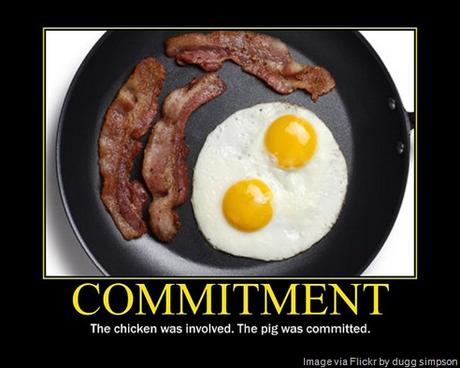 In my role as advisor to small businesses, I often think of the old joke, “In a bacon-and-egg breakfast, the chicken is very involved, but the pig is committed.” Some business owners claim to be committed, but seem quick to look to someone else to make the hard decisions, or some external factor to blame for challenges. On the road to success, the buck always stops with you.
In my role as advisor to small businesses, I often think of the old joke, “In a bacon-and-egg breakfast, the chicken is very involved, but the pig is committed.” Some business owners claim to be committed, but seem quick to look to someone else to make the hard decisions, or some external factor to blame for challenges. On the road to success, the buck always stops with you.
Some argue that success is all about being "blessed with talent" or even just lucky. Billionaire Mark Cuban writes on his blog that it took an incredible amount of commitment and work to benefit from his luck. When starting his first company, he routinely stayed up until two in the morning reading about new software, and went seven years without a vacation.
Even after many years running his company, retiring, and returning, Starbucks CEO Howard Schultz still gets into the office by six in the morning and stays until seven PM. Schultz then talks to overseas employees even later at night from home. He goes into the office on Sundays and reads emails from his thousands of employees on Saturdays. That’s commitment.
On the other hand, I often hear from “wanna-be” entrepreneurs who dream of being their own boss, and working their own hours by running their own business. Let me assure you, if you don’t have the mindset to fully commit to all the rigors of owning a business, you will be happier taking orders, and a paycheck, from someone else.
From my own experience, for your own calibration, here are some indications of what I believe truly committed means for a business professional and leader today:
-
Actively proclaims leadership and responsibility. The most successful business owners are not hesitant to ask for advice, but would not dream of letting someone else make the final decision. They only blame themselves when things go wrong, but are quick to try again, and never give up. They don’t like to share rewards or responsibility.
-
Demonstrates ongoing passion for the business. Committed owners love their idea, and you can hear the commitment in their voice and dedication. Often they connect their work with a higher purpose, such as changing the world, rather than just making money. My challenge as advisor is to help them find facts and structure to validate their passion.
-
Does not seek repeated confirmation of value. In business, count on it being lonely at the top. If your psyche is one that needs regular positive feedback, and a commensurate paycheck to stay motivated, you need to find a real job rather than an entrepreneurial one. The best businesses are innovative, which means venturing into the unknown.
-
Gives priority to business demands over social. If you find yourself unable to clear your head of work-related thoughts at the end of the day, that’s commitment. Social relationships are important, and you do need to blank out work from time to time, but if social priorities are at the top of your list, you won’t enjoy the business owner role.
-
Gets satisfaction from solving business challenges. Some people need a predictable schedule, for personal reasons or just peace of mind. Entrepreneurs need to be flexible, and assume there will be long working hours. If you are annoyed rather than exhilarated at the unpredictable schedule at your business, you may be involved but not committed.
-
Never finds time or interest in a real vacation. Most business owners I know can’t remember the last time they had a “real” vacation (without bringing their work along). This may not be healthy, but it illustrates the level of commitment of your competitors in the marketplace. Many see trade shows or business expositions as their vacations.
-
The thought of retirement suggests boredom. Most employees involved with a business are working hard, but are looking forward to retirement. The most committed entrepreneurs wouldn’t think of retiring, even if they made millions from the current project. They enjoy work too much to retire, and can’t wait to start their next venture.
These characteristics are not a statement of right or wrong, but just different strokes for different folks. The next time you have the urge to chuck your day job and jump to your dream role, remember to test yourself first against these principles of commitment. It’s a hard landing, and a big climb back up the cliff, if you change your mind after the jump.

